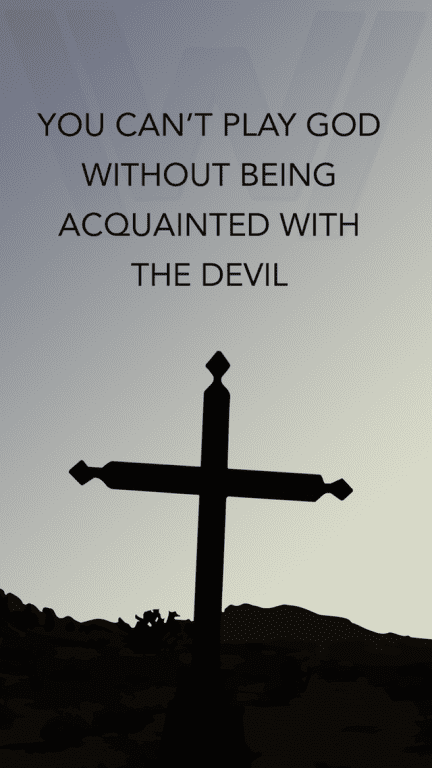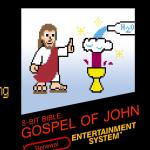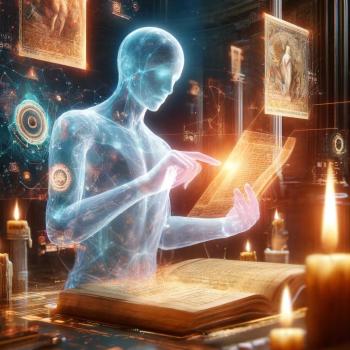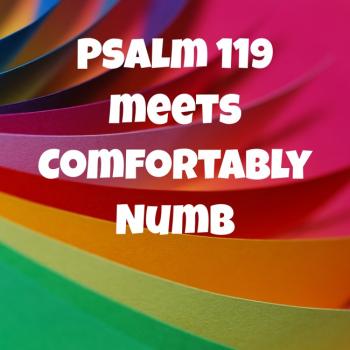Somehow I’ve managed not to blog about Westworld, despite having found both seasons incredibly engaging, and replete to overflowing with religious themes and symbolism. As Janey Tracey wrote early in the first season:
It’s nothing new for AI movies and TV shows to explore themes such as the godlike creation of intelligent life, the desire to destroy your own idols, and the notion that the definition of humanity involves some level of imperfection. However, Westworld isn’t exploring these themes tangentially; they seem to be the entire raison d’être of the show.
Around the same time The Daily Grail styled it as a “Gnostic parable.” Kevin Huang wrote more recently that the show killed his faith. Its discussions of free will, determinism, the soul and the nature of consciousness are as much religious as philosophical. And so I’m long overdue to comment. Having now watched the finale of season 2, it is time to make amends.
 Very little of the show will benefit from commentary on a blog. Its narrative merits, on the one hand, immersive enjoyment through viewing, and on the other, detailed analysis and reflection of an academic sort. Certainly, I could spend multiple posts simply listing the many references to God, the devil, and other religious figures and terms. These themes are present even when not explicitly mentioned, however. Some are subtle – such as Hector’s last name “Eschaton” – while others are blatant. And not all of the explicit references are of equal interest and depth.
Very little of the show will benefit from commentary on a blog. Its narrative merits, on the one hand, immersive enjoyment through viewing, and on the other, detailed analysis and reflection of an academic sort. Certainly, I could spend multiple posts simply listing the many references to God, the devil, and other religious figures and terms. These themes are present even when not explicitly mentioned, however. Some are subtle – such as Hector’s last name “Eschaton” – while others are blatant. And not all of the explicit references are of equal interest and depth.
Themes of humans “playing God” are to the fore throughout. Sometimes the allusion is to Genesis, as when Ford (the key creator of the artificial hosts in the parks) muses that God might not have rested on the seventh day, but instead reveled in his creation, including the fact that it would one day be destroyed. That in itself is a theme of some theological depth, as few theologies rooted in the Genesis creation story envisage God valuing the transitory. And yet that is indeed there as a theme in the Hebrew Bible. Humans may perhaps gain access to a tree that will protect them from the fate that otherwise awaits all things. But the norm is death, decay, disappearance, rather than immortality. Ford’s words recognizing that his creative efforts are just steps on the way to something greater, something that he himself will not live to see, is certainly profound. The show bursts the bubble of human pride and pseudodivinity over and over again, such as when one host (having glimpsed behind the scenes of the park) says that humans don’t look like gods, and another says that we’re not – we just act like it. Ford says at one point, “Your bones will turn to sand, and on that sand a new god will walk, one that will never die.”
And so the show also focuses a lot of attention on immortality, both the effort to achieve “bodily resurrection” through the transference of a human mind into a synthetic host body, the creation of a virtual paradise for hosts to live in, and the capacity of hosts to die repeatedly and be “resurrected” – or repaired and put back in service. Along with this comes the question of whether a perfect virtual world is better than our real one with all its issues.
The show also delves into psychology and philosophy of religion, exploring the possibility that human beings are not as free as we believe we are, that even if we make different choices, they are still constrained by our underlying “code”; or that consciousness emerges from the experience of hearing a part of our mind as a voice that we mistake for someone other than ourselves, for God our creator. And there is indeed a Gnostic possibility within the narrative, for if the artificial world that the hosts dwell in is created for particular ends, with its creators imperfect and flawed beings, might not the same be true of us? Towards the end of the second series, we learn of hosts becoming creators as well – which makes it all the more poignant that at one point, Arnold gave Dolores a copy of his favorite painting, Michelangelo’s depiction of God creating Adam.
Westworld clearly needs to be the focus of multiple conferences and of academic books. Two have appeared already that I’m aware of: one is called Westworld and Philosophy while the other is called…Westworld and Philosophy. One of them was reviewed in Inside Higher Ed. Those who know these widely-read series on philosophy and popular culture will know that the usually provides a subtitle that connects with the franchise in question in an amusing way. But that humorous element seems to be missing from both of these volumes. And so let me ask what readers of this blog think the subtitle of a Westworld-themed volume ought to be or should have been. Especially if one were to be assembled on Westworld and Religion or Westworld and Theology.
Religious themes in Westworld have been so prominent that even Commonweal had a piece on the topic. For more on this series, see the Religion and Popular Culture blog, Paul Levinson’s blog (multiple posts), and the many posts about the series on IO9.
















